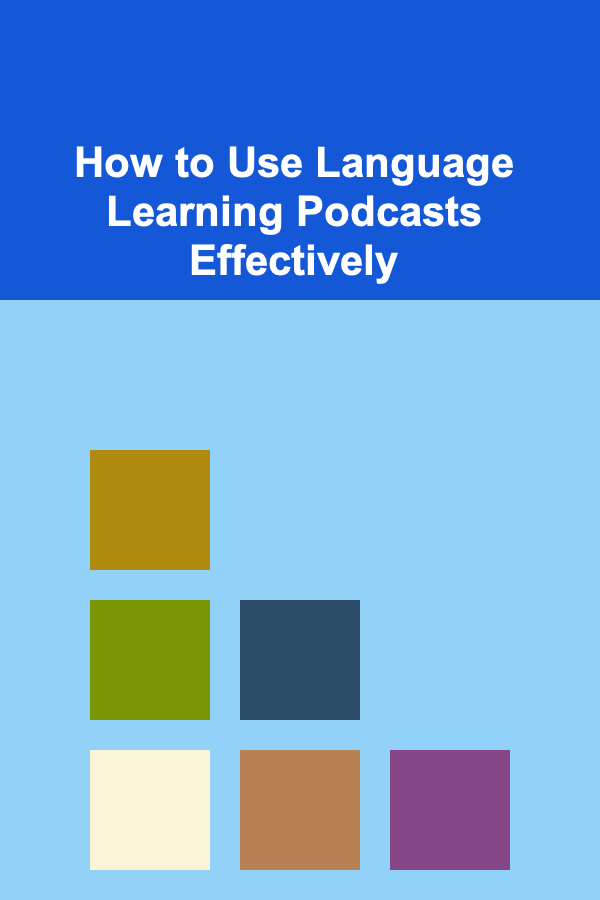
How to Use Language Learning Podcasts Effectively
ebook include PDF & Audio bundle (Micro Guide)
$12.99$10.99
Limited Time Offer! Order within the next:

In today's interconnected world, language learning has become more accessible and engaging than ever before. One of the most convenient and effective tools for language acquisition is the language learning podcast. Podcasts offer a flexible, on-the-go learning experience that can be tailored to individual needs and preferences. However, simply listening to podcasts isn't enough. To truly maximize their potential, it's crucial to understand how to use them strategically. This article provides a comprehensive guide to leveraging language learning podcasts for optimal results.
I. Choosing the Right Podcasts
The first step towards successful podcast-based language learning is selecting the right podcasts. With a plethora of options available, it's essential to consider several factors to ensure you choose resources that align with your learning goals and style.
A. Assessing Your Current Language Level
Before diving into any podcast, honestly assess your current language level. Are you a complete beginner, an intermediate learner, or an advanced speaker? Different podcasts cater to different proficiency levels. Starting with a podcast that's too advanced can be discouraging, while one that's too basic might not provide sufficient challenge.
- Beginner Podcasts: These podcasts typically focus on basic vocabulary, grammar, and pronunciation. They often use English (or your native language) extensively to explain concepts clearly.
- Intermediate Podcasts: These podcasts gradually increase the target language usage while still providing explanations and translations when necessary. They might explore more complex grammar points and introduce a wider range of vocabulary.
- Advanced Podcasts: These podcasts are primarily conducted in the target language, with minimal use of English (or your native language). They focus on nuanced expressions, idiomatic language, and complex topics.
B. Identifying Your Learning Goals
What are your specific language learning goals? Are you aiming to improve your conversational skills, expand your vocabulary, understand complex grammar, or learn about a specific culture? Identifying your goals will help you narrow down your podcast choices.
- Conversational Skills: Look for podcasts that feature dialogues, interviews, or discussions on everyday topics. These podcasts often focus on practical phrases and expressions.
- Vocabulary Expansion: Choose podcasts that introduce new words and phrases systematically, providing definitions, examples, and context.
- Grammar Improvement: Seek out podcasts that explicitly explain grammar rules and provide exercises to practice applying them.
- Cultural Understanding: Opt for podcasts that explore cultural aspects of the target language, such as customs, traditions, history, and current events.
C. Exploring Different Podcast Formats
Language learning podcasts come in various formats. Some are structured lessons, while others are more informal conversations or storytelling programs. Experiment with different formats to find what resonates with you and keeps you engaged.
- Lesson-Based Podcasts: These podcasts typically follow a structured curriculum, with each episode focusing on a specific topic or skill. They often include explanations, examples, and exercises.
- Conversation-Based Podcasts: These podcasts feature conversations between native speakers or between a teacher and a student. They provide exposure to natural language and different speaking styles.
- Storytelling Podcasts: These podcasts tell stories in the target language, often with accompanying transcripts and vocabulary explanations. They can be a fun and engaging way to improve your listening comprehension and expand your vocabulary.
- News Podcasts: These podcasts provide news updates in the target language, helping you stay informed about current events while improving your language skills.
D. Considering Podcast Length and Frequency
Think about how much time you can realistically dedicate to listening to podcasts each week and how often you prefer to listen. Choose podcasts that fit into your schedule and that release new episodes frequently enough to keep you motivated but not so frequently that you feel overwhelmed.
E. Reading Reviews and Recommendations
Before committing to a podcast, read reviews and recommendations from other learners. This can give you valuable insights into the podcast's quality, effectiveness, and suitability for your learning style. Look for podcasts that have consistently positive reviews and that are recommended by reputable language learning resources.
Example: Let's say you're an intermediate Spanish learner who wants to improve your conversational skills. You might search for "Spanish conversation podcasts intermediate" and then read reviews on various platforms like Apple Podcasts, Spotify, or language learning blogs. You might find recommendations for podcasts like "Notes in Spanish Intermediate," which features conversations between a native Spanish speaker and a learner, or "Coffee Break Spanish," which offers structured lessons and dialogues on everyday topics.
II. Active Listening Strategies
Simply listening passively to podcasts won't lead to significant progress. To maximize the benefits, you need to engage in active listening strategies. This means actively participating in the learning process by focusing your attention, taking notes, and practicing what you hear.
A. Setting Realistic Goals
Before you start listening, set realistic goals for each episode. What do you want to achieve? Do you want to learn five new vocabulary words, understand a specific grammar point, or simply improve your listening comprehension? Having clear goals will help you stay focused and motivated.
B. Listening Multiple Times
Don't expect to understand everything on the first listen. Listen to each episode multiple times, focusing on different aspects each time.
- First Listen: Listen for the overall meaning and try to get a general understanding of the topic. Don't worry about understanding every single word.
- Second Listen: Focus on specific vocabulary or grammar points that you identified as important in your goals. Take notes and look up any words or phrases you don't understand.
- Third Listen: Listen actively, trying to shadow the speakers (i.e., repeating what they say as they say it). This will help improve your pronunciation and fluency.
C. Taking Notes Effectively
Taking notes is a crucial part of active listening. Don't just passively write down everything you hear. Instead, focus on key vocabulary, grammar points, and cultural insights.
- Vocabulary Notes: Write down new words and phrases, along with their definitions, examples, and pronunciation.
- Grammar Notes: Note down any grammar rules or structures that are explained in the podcast. Include examples of how they are used.
- Cultural Notes: Note down any cultural references or insights that are shared in the podcast. This will help you understand the context of the language.
D. Using Transcripts and Subtitles
Many language learning podcasts provide transcripts or subtitles. These can be invaluable tools for improving your comprehension and identifying words and phrases you might have missed. However, don't rely on transcripts or subtitles exclusively. Try to listen without them first, and then use them to check your understanding and fill in any gaps.
E. Pausing and Repeating
Don't be afraid to pause the podcast frequently to give yourself time to process the information. Repeat sentences or phrases that you find difficult to understand. This will help you train your ear and improve your listening comprehension.
F. Focusing on Pronunciation
Pay attention to the pronunciation of the speakers. Try to imitate their intonation, rhythm, and stress patterns. This will help you improve your own pronunciation and make you sound more natural when you speak.
Tip: Use a pronunciation checker app (like Forvo or YouGlish) to verify your pronunciation and compare it to native speakers.
III. Integrating Podcasts with Other Learning Resources
Podcasts are a valuable tool, but they are most effective when integrated with other language learning resources. Combining podcasts with textbooks, online courses, language exchange partners, and other resources will create a more well-rounded and effective learning experience.
A. Using Podcasts to Supplement Textbooks and Courses
Use podcasts to reinforce what you're learning in your textbooks or courses. Listen to podcasts that cover the same topics or grammar points. This will provide you with additional exposure to the material and help you solidify your understanding.
B. Connecting with Language Exchange Partners
Find a language exchange partner who speaks the target language. Use the vocabulary and phrases you learn from podcasts in your conversations with your partner. This will give you the opportunity to practice what you've learned in a real-world setting.
C. Utilizing Online Resources
There are many online resources that can complement your podcast learning. Use online dictionaries to look up unfamiliar words, online grammar guides to review grammar rules, and online forums to connect with other learners.
D. Engaging with Social Media
Follow language learning accounts on social media. Many language learning experts share tips, resources, and encouragement on platforms like Instagram, Twitter, and Facebook. You can also find communities of language learners who are using podcasts to learn the same language as you.
E. Watching Videos and Films
Supplement your podcast listening with videos and films in the target language. This will provide you with visual context and help you understand the language more easily. Start with videos or films that have subtitles, and gradually work your way up to watching them without subtitles.
Example: You're learning French using the "FrenchPod101" podcast and a textbook. The podcast episode covers the topic of ordering food in a restaurant. You can then find a French restaurant menu online, practice role-playing ordering food with a friend, and watch a short YouTube video about French restaurant etiquette. This multi-faceted approach reinforces the vocabulary and grammar learned in the podcast.
IV. Staying Motivated and Consistent
Language learning is a marathon, not a sprint. It takes time, effort, and dedication. Staying motivated and consistent is crucial for long-term success.
A. Setting Realistic Goals and Expectations
Don't expect to become fluent overnight. Set realistic goals for yourself and celebrate your progress along the way. Break down your learning goals into smaller, more manageable steps.
B. Creating a Study Schedule
Create a study schedule that fits into your lifestyle and stick to it as much as possible. Even if you can only dedicate 15-30 minutes per day to language learning, consistency is key.
C. Finding an Accountability Partner
Find a friend, family member, or fellow language learner who can hold you accountable for your learning goals. Check in with each other regularly and share your progress.
D. Rewarding Yourself
Reward yourself for achieving your learning goals. This could be anything from watching a movie in the target language to treating yourself to a nice meal.
E. Making It Fun
Language learning should be enjoyable. Find ways to make the process fun and engaging. Listen to podcasts that you find interesting, watch movies that you enjoy, and connect with other learners who share your passion.
F. Tracking Your Progress
Keep track of your progress to see how far you've come. This can be motivating and help you identify areas where you need to focus more attention. You can use a language learning journal, a spreadsheet, or a language learning app to track your progress.
Tip: Use a habit tracker app (like Habitica or Streaks) to track your language learning progress and stay motivated.
V. Addressing Common Challenges
Learning a language with podcasts, while effective, isn't without its challenges. Here are some common issues and how to overcome them:
A. Difficulty Understanding Fast Speech
Many learners struggle to understand native speakers who speak quickly. Here's how to address this:
- Slow Down the Playback Speed: Most podcast apps allow you to slow down the playback speed. Start by slowing it down to 0.75x or 0.5x until you can understand the content more easily. Gradually increase the speed as your comprehension improves.
- Focus on Key Words: Instead of trying to understand every single word, focus on the key words that convey the main idea. These are typically nouns, verbs, and adjectives.
- Practice Listening to Different Accents: Expose yourself to different accents of the target language. This will help you train your ear to recognize different pronunciation patterns.
B. Limited Opportunities for Speaking Practice
Podcasts primarily focus on listening comprehension. To improve your speaking skills, you need to actively seek out opportunities to speak the language.
- Find a Language Exchange Partner: As mentioned earlier, a language exchange partner can provide you with valuable speaking practice.
- Join a Language Learning Group: Look for language learning groups or clubs in your area. This is a great way to meet other learners and practice your speaking skills in a supportive environment.
- Use Language Learning Apps with Speaking Features: Some language learning apps, such as Duolingo and Babbel, offer speaking exercises that can help you improve your pronunciation and fluency.
- Record Yourself Speaking: Record yourself speaking the target language and then listen back to identify areas where you need to improve.
C. Lack of Personalization
Podcasts are often designed for a general audience, so they may not always address your specific learning needs or interests. To personalize your learning experience:
- Choose Podcasts That Align with Your Interests: Look for podcasts that cover topics that you find interesting. This will make the learning process more enjoyable and engaging.
- Create Your Own Podcast-Based Exercises: Design your own exercises based on the content of the podcasts you're listening to. For example, you could write a summary of an episode, answer comprehension questions, or create a dialogue based on a conversation you heard.
- Use the Podcast as a Springboard for Further Exploration: If a podcast episode sparks your interest in a particular topic, research it further using other resources, such as books, articles, or videos.
D. Feeling Overwhelmed
Language learning can be overwhelming, especially when you're starting out. If you're feeling overwhelmed:
- Break Down Your Learning Goals: Divide your learning goals into smaller, more manageable steps.
- Focus on One Thing at a Time: Don't try to learn everything at once. Focus on mastering one skill or topic before moving on to the next.
- Take Breaks: Don't be afraid to take breaks when you're feeling overwhelmed. It's better to take a short break and come back refreshed than to push yourself too hard and burn out.
- Celebrate Your Progress: Acknowledge and celebrate your progress, no matter how small. This will help you stay motivated and focused on your goals.
VI. Conclusion
Language learning podcasts offer a powerful and convenient way to improve your language skills. By choosing the right podcasts, employing active listening strategies, integrating them with other learning resources, and staying motivated, you can unlock their full potential and achieve your language learning goals. Remember to be patient, persistent, and proactive in your learning journey. With dedication and the right approach, you can successfully leverage language learning podcasts to become a fluent and confident speaker of your target language. The key is to move beyond passive listening and actively engage with the material. Listen intentionally, take notes, practice pronunciation, and supplement your learning with other resources. Embrace the challenge, enjoy the process, and celebrate your progress along the way. Happy listening and learning!

How to Make Money Online as a Web Developer: 10 Actionable Ideas
Read More
How to Use Vertical Space for Better Storage in Small Apartments
Read More
The Art of Maintenance: Strategies for Efficient System Repairs and Equipment Longevity
Read More
The Public Relations Specialist's Playbook: Building Brand Reputation
Read More
How to Understand Why People Believe in Conspiracy Theories
Read More
How to Master Iron Condors
Read MoreOther Products

How to Make Money Online as a Web Developer: 10 Actionable Ideas
Read More
How to Use Vertical Space for Better Storage in Small Apartments
Read More
The Art of Maintenance: Strategies for Efficient System Repairs and Equipment Longevity
Read More
The Public Relations Specialist's Playbook: Building Brand Reputation
Read More
How to Understand Why People Believe in Conspiracy Theories
Read More